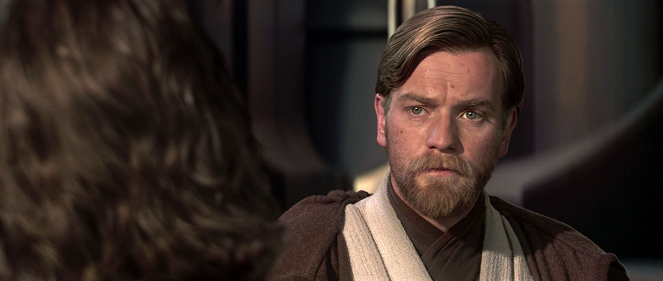Directed by:
George LucasScreenplay:
George LucasCinematography:
David TattersallComposer:
John WilliamsCast:
Ewan McGregor, Natalie Portman, Hayden Christensen, Ian McDiarmid, Samuel L. Jackson, Jimmy Smits, Frank Oz, Anthony Daniels, Christopher Lee (more)VOD (4)
Plots(1)
Discover the true power of the dark side. Clone Wars rage across the galaxy. The sinister Sith Lord seizes control of the Republic and corrupts Anakin Skywalker to be his dark apprentice, Darth Vader. Obi-Wan Kenobi must confront his fallen friend in an epic lightsaber duel. (Disney / Buena Vista)
Videos (1)
Reviews (13)
Peter Jackson said that the first two Lord of the Rings movies were made so that the third one could exist. However, such a statement better applies to Star Wars. It is surprising how Episode III gradually changes form – it starts out in the spirit of the popcorn flicks Episode I and Episode II, then begins to take on the style of the original trilogy, and ends in such a way that you have a powerful need to see Episode IV. This transition shows us why the two preceding volumes were so weak dramatically and confirms WHO the main “hero” of the whole saga is and WHAT the most important element of a narrative fantasy film is. In Jackson’s case, it was Sauron; for Lucas, it’s Darth Vader. In filmmaking terms, Episode III is better than the two previous episodes only in the last 20 minutes (which reach the dramatic level of Episode V). The rest of Episode III is more engaging not because it was written or filmed with greater skill, but because it’s about something. What would The Fellowship of the Ring be if Sauron hadn’t been mentioned in it and depicted as the greatest and most powerful evil? It would be good to edit Episode I and Episode II into a single two-hour prequel and start the saga that we all love with Episode III. May the Dark Side be with you, Anakin!
()
When it came to the crucial part that was supposed to connect everything, it finally managed to tie in with the original trilogy in terms of the fourth and fifth installments. This is a stunningly dark conclusion to the new trilogy, so dark that it will chill you sometimes. Visually, it is magnificent, from the beginning, the duel with Grievous is one of my favorites, as well as Yoda's confrontation with Sidious (Yoda doesn't finish this fight) and Obi-Wan's with Vader.
()
Episode III is a desperate fugue in which the wandering torso of the Jedi order tries to patch up what it can to end up in utter disillusionment and agony. Lucas indulges the viewer with his spectacular tricks, but almost from the beginning of the film, he amplifies an evil hunch and amplifies the dark undertone that culminates, both audibly and visually, in a scene where Anakin makes a fatal decision in the abandoned Jedi Temple to help his seducer Palpatine. Although George Lucas is a mediocre director, this scene and several others (especially the destruction of the Jedi) are among the most emotionally powerful in the six-part series. In Episode III, he manages to maintain a rhythm and pace that escalates brilliantly towards the end to the wild staccato of hopeless scenes that form the imaginary highlight of the new trilogy. It is unusually naturalistic and completely resonates with the new atmosphere that Star Wars has received both through new episodes and, above all, with a series of computer games. The impression is monstrous, urgent, immediate. There's not much to add – Revenge of the Sith is proof that all the mistakes of the previous two films were worth it, as they built the bridge to the truly grand finale. Complaints – the action scenes are too stretched and suffer from the classic visual gluttony of the digital age, of which Lucas is the guiding spirit. Too many colors and effects lead to clutter. John Williams' music is kind of stiffened, but it works at key moments. Yes, and then the few reminisces of incredibly starchy love dialogues. But very few. Too few to ruin an episode that really doesn't have to be ashamed to be in the company of A New Hope and The Empire Strikes Back.
()
Dramaturgically, it’s much more mature and immersive than the two previous episodes. It’s incredibly spectacular and dynamic in its individual attractions, which exquisitely heightens the atmosphere and, for the first time in the new trilogy, revels in fatality and visual darkness. While Lucas is absolutely incapable of any psychological level, and SW in his hands remains a cold showcase of intergalactic filmmaking possibilities and worlds, this instalment at least has the narrative balls and verve to make me gladly forgive him for the mechanical dialogue or the dull character shift by the awful Christensen. It's got major conflict, pivotal moments of the entire saga, and an ultra-cool Yoda and Obi-Wan whose separate story-arcs, capped by two parallel and iconic duels, I would sketch in the starry sky at night and always watch before falling asleep. The transition to A New Hope is finally completed, George Lucas, you have my respect...
()
The most expensive camp movie of all time. In contrast to the straightforwardly tasteless Spaceballs, the conclusion of the prequel trilogy offers the properly attuned audience a multi-layered farce with a magnificently overwrought script that abounds with cartoonish characters, absurd sequences and absolutely zero logic. The film’s greatest enigma is Hayden Christensen; even more so than in the second episode, it is impossible to tell if he is a terrible actor or, conversely, very good at playing a horrible asshole (Ian McDiarmid, on the other hand, portrays the nascent emperor with positively swaggering self-indulgence). Episode III similarly also culminates the other drawbacks of the previous instalment. Apart from the ridiculous emo gloominess, the film’s main fault lies in the fact that the narrative doesn’t develop its own story, but serves merely to establish the motifs of the original trilogy. Generally speaking, the audience’s familiarity with the denouement doesn't automatically mean that a film can’t be engaging – one of the best examples of which is Singer’s Valkyrie. This can be achieved by building tension, developing supporting sub-motifs or parallel storylines, or by simply building a fictional world. But Lucas does not do any of these things, relying instead on superficial fanservice and bluntly and literally filling in the gaps in a story that previously at least offered the promise of ambiguity (though the film also introduces a number of gaps in logic into the saga). And what is the moral and denouement of Episode III and with it the completed saga? The Force reaches equilibrium through several decades of the destructive, capricious behaviour of a childishly unhinged egocentric asshole who first subverts the religiously degenerate Jedi and then literally topples the brilliant manipulator and master of chance, the emperor. On the one hand, we can understand this as a stimulating impetus in relation to prophecy, the interpretation of history and the importance of the individual in history, but it’s not exactly exciting for viewers. So, it's actually nice of Lucas to wrap up this denouement in such a wildly bad movie that invites amused commentary at every moment.
()



Ads